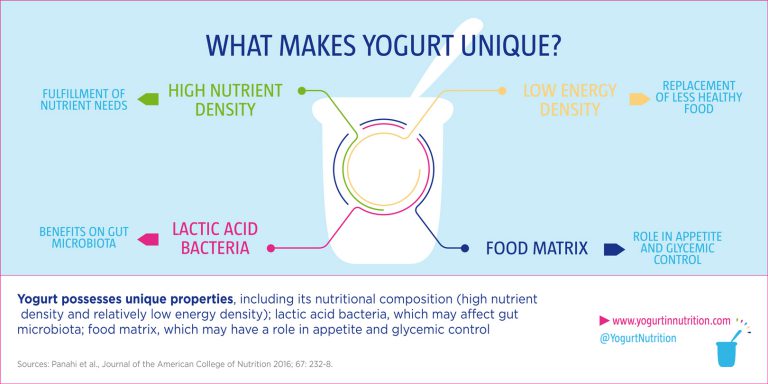The Whole Story of Yogurt

As a dietitian, I have the habit of breaking foods down based on their nutrient contributions. For example, I might point out to my patients that lentils are a great source of iron and folate or strawberries are an excellent source of vitamin C or yogurt provides calcium. But as nutrition science evolves, we now understand that this is an over-simplified way to look at the merit of a food. There are thousands of compounds in foods that contribute to health in ways we don’t always understand. Truly, the whole food is greater than the sum of its nutrient parts.
This concept was on central display at the recent Yogurt in Nutrition Initiative (YINI) summit in Boston on June 10th — Yogurt, more than the sum of its parts. I participated as a virtual participant on twitter and learned a number of new concepts regarding yogurt that go beyond its impressive nutrient contribution. While most of us are aware that yogurt is a nutrient-rich food which provides protein, calcium, potassium, vitamin B12 and other important nutrients, yogurt intake is also associated with a number of positive health markers.
A Healthy Gut
Yogurt with live, active cultures feeds our gut microbiota, the population of trillions of microbes living in our intestinal tract. Just like us, our tiny microbe friends also respond to a healthy and varied diet. The live microorganisms (probiotics) in yogurt contribute helpful bacteria to our gut which serves to strengthen our body’s immune function. A healthy microbiota plays a role in managing inflammation which in turn can lower our risk of chronic diseases.
The probiotics present in yogurt also help to break down lactose into lactic acid, making yogurt more digestible for those with lactose intolerance.
Food Pattern & Lifestyle
Eating yogurt seems to be associated with a better overall food pattern. Those who eat yogurt regularly are more likely to have better overall nutrient intakes, exercise regularly and are even less likely to smoke or drink alcohol excessively.
Since yogurt pairs well with other nutrient-dense foods, it makes sense that yogurt eaters will also have higher intake of whole grains, whole fruits and vegetables.
Reduced Risk of Chronic Disease
Eating yogurt regularly is also associated with reduced weight gain over time, a reduced risk of Type 2 diabetes and a reduced risk of cardiovascular diseases.
Dr. Prof. Arne Astrup, Head of the Department of Nutrition, Exercise and Sports at the University of Copenhagen, presented compelling research regarding the role of full fat yogurt and other dairy products in health and disease prevention. A new area of research into full-fat dairy involves the milk fat globule membrane or MFGM, the biological membrane that surrounds the lipid droplets in milk. According to Dr. Astrup, “the MFGM has been shown to have a beneficial effect on blood lipids and insulin resistance. This membrane appears to work with the unique dairy matrix of nutrients and microbiota metabolites to promote health effects.”
Thus, it is not always necessary to limit yogurt or other dairy foods to the low- or fat-free options that are widely recommended in current dietary guidelines. Adding full fat yogurt to the mix may help with both satiety and weight management while providing important lipid compounds that contribute to health.

As a pediatric and sports dietitian, I frequently recommend yogurt as an option for meals and snacks. In addition to the great nutrient profile, I can now also feel confident that the benefits of yogurt go far beyond the vitamins, minerals and protein content.
For a detailed summary of the symposium proceedings, visit http://www.yogurtinnutrition.com/yogurt-benefits-symposium-dairy-matrix/
